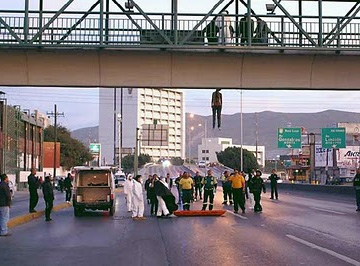
|  |  |  Editorials | Issues Editorials | Issues  
Out of Prison and Into Mortal Danger in Mexico
 Tracy Wilkinson - Los Angeles Times Tracy Wilkinson - Los Angeles Times
go to original
January 04, 2011


| | Scene of the place where "La Pelirroja" was found hanging from a bridge. |  |
Mexico City — They called her La Pelirroja, The Redhead.

After languishing in jail on kidnapping charges for more than a year, she was abruptly sprung from custody two days after Christmas, during what may have been a bogus medical transfer.

But instead of being freed, Gabriela Muniz was within days found hanging by the neck from a pedestrian overpass in Mexico's wealthiest city, Monterrey — a brutally rare fate for a woman, even amid this nation's depraved and escalating drug violence.

Was it score-settling among gangs? Or was this an even more sinister example of vigilante justice by affluent private parties determined to restore what they see as law and order to their enclave?

"Since there are no rules — the big businessmen have no rules, the narcos have no rules — it is difficult to know what this was," Samuel Gonzalez, former head of organized crime investigations for the federal government, said in a telephone interview Monday. "But if it is a case of private 'justice,' then this is really a terrible, terrible phenomenon."

The body of Muniz, in her early 30s, was discovered over the holiday weekend. It was found naked from the waist up, and letters that may have formed a man's name were painted onto her back. Although she showed signs of having been beaten, forensic specialists said the hanging appeared to have been what killed her.

While it has become disturbingly common for the mutilated bodies of men to be strung from bridges and overpasses, this is the first time in recent memory that a woman received the same punishment.

Muniz's torture and slaying served as something of an exclamation point to the deadliest year on record in Mexico's drug war, which has claimed more than 30,000 lives since December 2006.

Muniz had been in prison since July 2009, accused of leading a band of kidnappers and extortionists whose victims included wealthy ranchers, truckers and restaurateurs.

As Mexico's industrial and commercial hub, Monterrey had long been immune to the drug-trafficking warfare plaguing much of the country. This last year, however, as two cartels battled for dominance of Monterrey, it too suffered the same sort of broad-daylight shootouts, kidnappings and abuse by traffickers, who seized control of parts of the city. The murder rate rose more than tenfold from 2009 to 2010.

But unlike parts of the country abandoned to the violence, influential businessmen have fought back, hiring private security firms and consultants and taking out full-page newspaper advertisements demanding action by the government and its security forces.

Among some business and political leaders, however, there is an ominous undercurrent that the government forces cannot be trusted. Mauricio Fernandez, the mayor of Monterrey's exclusive suburb San Pedro Garza Garcia, boasted in late 2009 that he was forming private "intelligence squads" to "cleanse" his jurisdiction of undesirables who included notorious kidnappers.

Fernandez eventually had to back down amid an intense, if tardy, flurry of criticism. But the episode raised the notion of sanctioned vigilantism that many experts say is a product of the generalized feeling of insecurity and government impotence in the face of powerful traffickers and aggressive kidnappers.

So far, the investigation into The Redhead's escape from custody and her subsequent demise has focused on official corruption. On the night of Dec. 27, a prison doctor ordered Muniz, rumored to have been romantically involved with a cartel leader, transferred from the jail to a hospital, supposedly for a stomach ailment. Three guards were escorting her when intercepted by gunmen who took her away.

Initially, the escape was chalked up to the same sort of inside jobs that have freed scores of violent prisoners from jail in the last year. Later, the doctor told authorities that he had been threatened with death if he didn't order Muniz's transfer. The doctor, the three guards and a prison warden are being held for questioning. An additional 55 guards were questioned and released.

wilkinson(at)latimes.com |

 |
|  |



